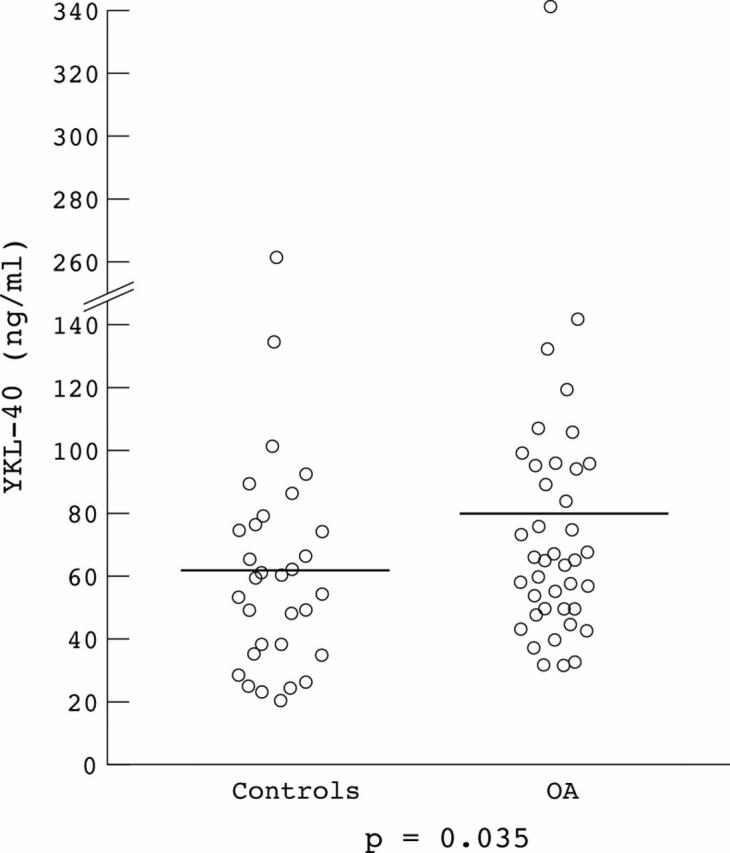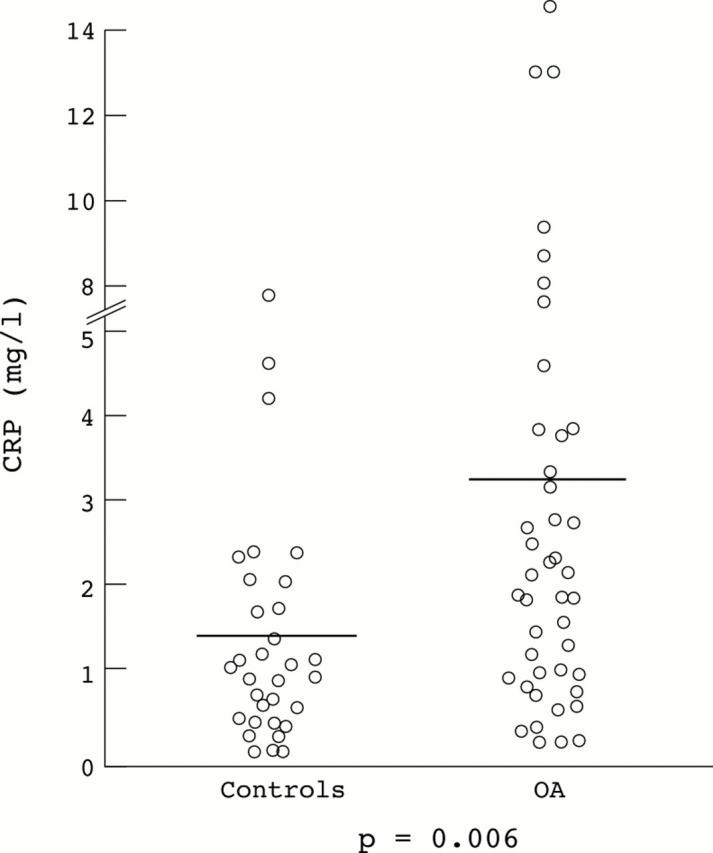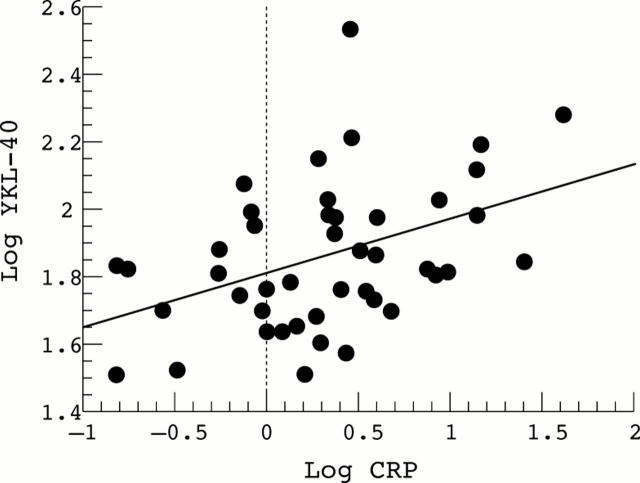Abstract
BACKGROUND—YKL-40 is a 40 kDa glycoprotein secreted by chondrocytes and synoviocytes. It has been suggested that it is a surrogate marker of synovial inflammation and joint destruction in rheumatoid arthritis (RA) and osteoarthritis (OA) and related to C reactive protein (CRP) serum levels in RA. OBJECTIVE—To study serum levels of YKL-40 in patients with hip OA and its relation with CRP. METHODS—YKL-40 and CRP were assayed in serum samples from 45 patients (24 women, 21 men, mean age 65) with symptomatic OA of the hip and 33 healthy controls. YKL-40 was assayed by immunoassay and CRP by ultrasensitive immunonephelometry. OA severity was assessed by the measurement of joint space width with a computer analysis system of digitised hip radiographs. Statistical analysis was performed to determine correlations between serum markers and radiological joint space width. RESULTS—The mean (standard error) YKL-40 level was 90.3 (8.2) ng/ml in patients with hip OA and 66.9 (8.2) ng/ml in controls (p=0.03). The mean CRP level was 2.93 (3.03) mg/l in OA and 1.40 (1.61) mg/l in controls (p=0.006). The serum levels of YKL-40 and CRP increased with age and were significantly correlated (Spearman test: rs=0.42, p=0.005) in patients but not in controls. Neither YKL-40 nor CRP correlated with radiographic joint space width. CONCLUSIONS—Serum YKL-40 was significantly increased in patients with hip OA. The correlation between YKL-40 and CRP suggests that YKL-40 may be a marker of joint inflammation in OA. Longitudinal studies are required to assess the usefulness of YKL-40 in the monitoring of patients with hip OA.
Full Text
The Full Text of this article is available as a PDF (129.0 KB).
Figure 1 .

Comparison of YKL-40 serum levels in 45 patients with hip osteoarthritis (OA) and 33 healthy controls (Mann-Whitney U test, p=0.035).
Figure 2 .

Comparison of C reactive protein (CRP) serum levels in 43 patients with hip osteoarthritis (OA) and 32 healthy controls (Mann-Whitney U test, p=0.006).
Figure 3 .
Correlation between serum concentrations of YKL-40 and C reactive protein (CRP; rs=0.42, p=0.005) in 45 patients with osteoarthritis of the hip (log transformed data).
Selected References
These references are in PubMed. This may not be the complete list of references from this article.
- Altman R., Alarcón G., Appelrouth D., Bloch D., Borenstein D., Brandt K., Brown C., Cooke T. D., Daniel W., Feldman D. The American College of Rheumatology criteria for the classification and reporting of osteoarthritis of the hip. Arthritis Rheum. 1991 May;34(5):505–514. doi: 10.1002/art.1780340502. [DOI] [PubMed] [Google Scholar]
- Cintin C., Johansen J. S., Christensen I. J., Price P. A., Sørensen S., Nielsen H. J. Serum YKL-40 and colorectal cancer. Br J Cancer. 1999 Mar;79(9-10):1494–1499. doi: 10.1038/sj.bjc.6690238. [DOI] [PMC free article] [PubMed] [Google Scholar]
- Conrozier T., Chappuis-Cellier C., Richard M., Mathieu P., Richard S., Vignon E. Increased serum C-reactive protein levels by immunonephelometry in patients with rapidly destructive hip osteoarthritis. Rev Rhum Engl Ed. 1998 Dec;65(12):759–765. [PubMed] [Google Scholar]
- Conrozier T., Jousseaume C. A., Mathieu P., Tron A. M., Caton J., Bejui J., Vignon E. Quantitative measurement of joint space narrowing progression in hip osteoarthritis: a longitudinal retrospective study of patients treated by total hip arthroplasty. Br J Rheumatol. 1998 Sep;37(9):961–968. doi: 10.1093/rheumatology/37.9.961. [DOI] [PubMed] [Google Scholar]
- Conrozier T., Saxne T., Fan C. S., Mathieu P., Tron A. M., Heinegård D., Vignon E. Serum concentrations of cartilage oligomeric matrix protein and bone sialoprotein in hip osteoarthritis: a one year prospective study. Ann Rheum Dis. 1998 Sep;57(9):527–532. doi: 10.1136/ard.57.9.527. [DOI] [PMC free article] [PubMed] [Google Scholar]
- Conrozier T., Tron A. M., Mathieu P., Vignon E. Quantitative assessment of radiographic normal and osteoarthritic hip joint space. Osteoarthritis Cartilage. 1995 Sep;3 (Suppl A):81–87. [PubMed] [Google Scholar]
- Hakala B. E., White C., Recklies A. D. Human cartilage gp-39, a major secretory product of articular chondrocytes and synovial cells, is a mammalian member of a chitinase protein family. J Biol Chem. 1993 Dec 5;268(34):25803–25810. [PubMed] [Google Scholar]
- Harvey S., Weisman M., O'Dell J., Scott T., Krusemeier M., Visor J., Swindlehurst C. Chondrex: new marker of joint disease. Clin Chem. 1998 Mar;44(3):509–516. [PubMed] [Google Scholar]
- Johansen J. S., Baslund B., Garbarsch C., Hansen M., Stoltenberg M., Lorenzen I., Price P. A. YKL-40 in giant cells and macrophages from patients with giant cell arteritis. Arthritis Rheum. 1999 Dec;42(12):2624–2630. doi: 10.1002/1529-0131(199912)42:12<2624::AID-ANR17>3.0.CO;2-K. [DOI] [PubMed] [Google Scholar]
- Johansen J. S., Jensen H. S., Price P. A. A new biochemical marker for joint injury. Analysis of YKL-40 in serum and synovial fluid. Br J Rheumatol. 1993 Nov;32(11):949–955. doi: 10.1093/rheumatology/32.11.949. [DOI] [PubMed] [Google Scholar]
- Johansen J. S., Møller S., Price P. A., Bendtsen F., Junge J., Garbarsch C., Henriksen J. H. Plasma YKL-40: a new potential marker of fibrosis in patients with alcoholic cirrhosis? Scand J Gastroenterol. 1997 Jun;32(6):582–590. doi: 10.3109/00365529709025104. [DOI] [PubMed] [Google Scholar]
- Johansen J. S., Stoltenberg M., Hansen M., Florescu A., Hørslev-Petersen K., Lorenzen I., Price P. A. Serum YKL-40 concentrations in patients with rheumatoid arthritis: relation to disease activity. Rheumatology (Oxford) 1999 Jul;38(7):618–626. doi: 10.1093/rheumatology/38.7.618. [DOI] [PubMed] [Google Scholar]
- Johansen J. S., Williamson M. K., Rice J. S., Price P. A. Identification of proteins secreted by human osteoblastic cells in culture. J Bone Miner Res. 1992 May;7(5):501–512. doi: 10.1002/jbmr.5650070506. [DOI] [PubMed] [Google Scholar]
- Kirkpatrick R. B., Emery J. G., Connor J. R., Dodds R., Lysko P. G., Rosenberg M. Induction and expression of human cartilage glycoprotein 39 in rheumatoid inflammatory and peripheral blood monocyte-derived macrophages. Exp Cell Res. 1997 Nov 25;237(1):46–54. doi: 10.1006/excr.1997.3764. [DOI] [PubMed] [Google Scholar]
- Krause S. W., Rehli M., Kreutz M., Schwarzfischer L., Paulauskis J. D., Andreesen R. Differential screening identifies genetic markers of monocyte to macrophage maturation. J Leukoc Biol. 1996 Oct;60(4):540–545. doi: 10.1002/jlb.60.4.540. [DOI] [PubMed] [Google Scholar]
- Loose L. D., Sipe J. D., Kirby D. S., Kraska A. R., Weiner E. S., Shanahan W. R., Leeming M. R., Farrow P., Stack C. B., Ting N. Reduction of acute-phase proteins with tenidap sodium, a cytokine-modulating anti-rheumatic drug. Br J Rheumatol. 1993 Jun;32 (Suppl 3):19–25. doi: 10.1093/rheumatology/32.suppl_3.19. [DOI] [PubMed] [Google Scholar]
- Renkema G. H., Boot R. G., Au F. L., Donker-Koopman W. E., Strijland A., Muijsers A. O., Hrebicek M., Aerts J. M. Chitotriosidase, a chitinase, and the 39-kDa human cartilage glycoprotein, a chitin-binding lectin, are homologues of family 18 glycosyl hydrolases secreted by human macrophages. Eur J Biochem. 1998 Jan 15;251(1-2):504–509. doi: 10.1046/j.1432-1327.1998.2510504.x. [DOI] [PubMed] [Google Scholar]
- Sipe J. D., Bartle L. M., Loose L. D. Modification of proinflammatory cytokine production by the antirheumatic agents tenidap and naproxen. A possible correlate with clinical acute phase response. J Immunol. 1992 Jan 15;148(2):480–484. [PubMed] [Google Scholar]
- Spector T. D., Hart D. J., Nandra D., Doyle D. V., Mackillop N., Gallimore J. R., Pepys M. B. Low-level increases in serum C-reactive protein are present in early osteoarthritis of the knee and predict progressive disease. Arthritis Rheum. 1997 Apr;40(4):723–727. doi: 10.1002/art.1780400419. [DOI] [PubMed] [Google Scholar]
- Volck B., Ostergaard K., Johansen J. S., Garbarsch C., Price P. A. The distribution of YKL-40 in osteoarthritic and normal human articular cartilage. Scand J Rheumatol. 1999;28(3):171–179. doi: 10.1080/03009749950154257. [DOI] [PubMed] [Google Scholar]
- Wolfe F. The C-reactive protein but not erythrocyte sedimentation rate is associated with clinical severity in patients with osteoarthritis of the knee or hip. J Rheumatol. 1997 Aug;24(8):1486–1488. [PubMed] [Google Scholar]



